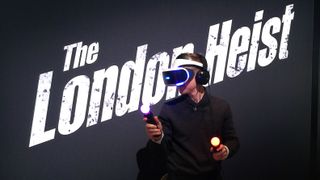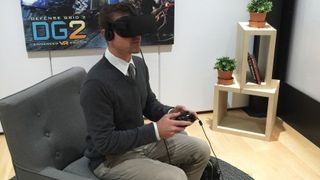Fully Immersed: A casual gamer's take on Oculus and PlayStation VR
Virtual reality's promise extends well beyond games

I used to love video games. You're looking at a guy who, on several occasions, feigned sickness to stay home from school and sink untold hours into Twisted Metal. I was a moderator for the (now-defunct) Heat.net online gaming portal, where I spent far too many evenings blasting away in Unreal. I maintained a subscription to Electronic Gaming Monthly, and the day of its arrival was undoubtedly the best day of whatever month it happened to be.
Then, I grew up.
As I've seen happen with so many others who now have no other choice but to call themselves "adults," I too became unable to game as much as I used to. I graduated university, took a couple of jobs, worked nights on a master's degree, and slept whenever I could.
Gaming just doesn't fit into that kind of lifestyle, and once I deprioritized gaming, the yearning to play new titles as soon as they hit shelves began to fade. These days, I'm what many would call a casual gamer. I still love games, but I don't have - nay, make - the time to play them regularly.
Activities like sleep, work, exercising, and getting on a plane to go somewhere have replaced the gaps I once filled with a gaming session. I get the feeling that I'm now in the majority. The casual gamer club tends to be made up of working adults -- people with real lives who place a tremendously high value on their leisure time.
As multiple generations of PlayStation, Xbox, and Wii have come and gone, my casualness hasn't budged. But there's one thing that could very well change that: virtual reality. A few months back at CES, the year's biggest consumer electronics gala, I got behind the mask of Sony's PlayStation VR and the finalized consumer version of the Oculus Rift. What I experienced was a joy that I haven't felt since Twisted Metal 2 arrived on the PS2.

15 minutes of gameplay seemed to pass in mere seconds. The immersion was genuinely unlike anything I've ever experienced, and that's coming from someone who has been privy to pretty much every technological innovation in the past decade. Though the apparatuses were different -- Oculus Rift connects to a PC, whereas PlayStation VR is tethered to a PS4 console -- the elation was the same.
Get daily insight, inspiration and deals in your inbox
Get the hottest deals available in your inbox plus news, reviews, opinion, analysis and more from the TechRadar team.
After my Oculus session, the first question I blurted out was one regarding its pricing and availability. (If you're curious, it's $599, and initial units are shipping out this week.) "What did I just ask?," I pondered internally. I posed the very question that practically everyone else will ask if able to try out a demo. VR is a sea change in the gaming universe.
The experience is so wholly immersive, so impressively capable of providing an entirely new level of escapism, that even casual gamers will make time to enjoy it. To boot, gaming is just the start. As I wrestled with myself about the sensibility of pre-ordering a $599 headset with no time to dedicate to gaming, it became ever clearer that VR will tick even more boxes once it's on the scene.
The potential for educating both children and adults via VR is staggering. The thought of using VR to swim through the Mariana Trench or explore the peak of Everest or scrutinize a high-rise before the first hammer is swung - it's all world-changing stuff.
Would I, a casual gamer, spend hundreds on a VR device just to play the next instalment of Call of Duty? Doubtful. But, considering just how multifaceted virtual reality will be - enabling a heretofore unseen level of immersion for education, entertainment, and gaming - the value proposition is greatly enhanced.
Consider me very interested indeed.
- It's Virtual Reality Week on techradar! Keep up with all our great content here
Most Popular


